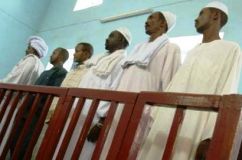Janjaweed militia blamed for Sudan atrocities
By ELLEN KNICKMEYER, Associated Press Writer
MISTIRIA, Sudan, Oct 5, 2004 (AP) — They wear uniforms without insignia, travel a rolling countryside of charred and emptied villages on camels, horses or pickup trucks with mounted machine guns, and call themselves “the Quick and the Horrible.”

|
|
Six Sudanese men stand in the dock in a court in Nyala September 30, 2004, accused of belonging to the Janjaweed. The Arab militia, who killed 24 people at Haluf, in north Nyala, in the southern Darfur region last October. |
International monitors and non-Arab African farmers who accuse them of raping, killing and burning call them something else: Janjaweed.
Fighters at this stronghold — visited by journalists Tuesday for the first time since Darfur’s war began — belong to the government-allied Arab militia that international monitors blame for the worst atrocities of the 20-month-old war.
The Darfur war has killed more than 50,000 people and driven 1.4 million others from their homes. Almost all of the displaced are non-Arab Africans, targets of what the United States says is a genocidal campaign by Khartoum’s Arab-dominated government.
Sudan is accused of coordinating military aerial bombing runs with ground raids by the Arab militia in the attacks on Darfur’s non-Arab villages, although all sides say mass attacks on civilians have eased under international scrutiny.
The Sudanese government describes its allies in Darfur as militias hastily organized to defend against rebels. The fighters known as Janjaweed, it says, are renegades and bandits, and it has no ties to those men.
But the international community and the victims of the violence say the fighters in Mistiria are the Janjaweed.
The fighters in Mistiria said Tuesday they have close ties to the government – in coordination, sympathies and the salaries of about $20 a month they collect.
“The government called on us to defend our land, and the tribes responded,” said fighter Ina Saleh, a member of the Arab Rizigat tribe, wearing a uniform with no marks or name tag. “We responded, like the other tribes.”
Mistiria, in northern Darfur, 16 miles west of the town of Kabkabiyeh, is identified by foreign governments and international rights groups as the birthplace of the Janjaweed.
In February 2003, Sudan’s government sent out a plea for fighters to help combat two non-Arab rebel groups that had taken up arms in western Darfur, the international community says, in accounts backed up by the fighters.
Arab tribal leader Musa Hilal, who lived in Mistiria, answered that plea, rallying men of several Arab tribes, training them and arming them, they say.
In all, some 2,000 tribal fighters responded to the government call, most from Hilal’s tribe, said Omer el Amin, a lawyer in Kabkabiyeh representing Hilal and other men now accused as alleged Janjaweed.
In Mistiria, they called themselves the Border Intelligence Division, and answered to Hilal, el Amin said.
The same group also calls itself the Second Reconnaissance Brigade, or the Quick and the Horrible, say officers of the African Union, a 53-nation bloc whose monitors are inspecting compliance with a repeatedly violated cease-fire.
None of the fighters identify themselves as Janjaweed. The term is used by the international community for some of the Arab militia fighters, including Hilal’s, but is seen here as an insult, reserved for bandits before Darfur’s conflict began.
With heavy international attention to accusations of genocide committed by the Janjaweed, Hilal is now in seclusion in the capital, under close watch by Sudanese officials, those in contact with him say.
The Border Intelligence Division, once spread out along Darfur’s border with Chad, has pulled much of its strength back to Mistiria. Government forces are firmly in control here, and the men allegedly recruited by Hilal are safe from any rebel attack and most outside scrutiny, other than the African Union monitors.
On Tuesday, men identifying themselves as members of the Border Intelligence group lolled in the shade of an open-sided shelter at the brigade’s headquarters, while their leaders met with the cease-fire monitors.
A handful of the fighters interviewed under scrutiny of their field commanders and Sudanese military officers variously said they were part of civil patrols, known as mujhadin — holy warriors — or part of the regular military.
The men and their officers said they were supplied and paid by the central government, but some, like fighter Mohamed Hamdan, could not identify their commanders in the military.
Hamdan contradicted himself repeatedly about when he joined his unit; he and Saleh both initially gave dates years in advance of Darfur’s conflict.
Both eventually said, however, that they took up arms in response to a government call to fight in 2003, when Darfur’s rebel groups rose up.
“The government called us to defend,” said Hamdan, a member of the Arab Mahmeed tribe.
As he spoke, men identifying themselves as members of the division strolled the town’s weekly market, where camels for sale crowded together.
Their local leader, Sgt. Abdul Waheed Saeed, stood among the stalls, answering journalists’ questions about whether he and his men feared international prosecution as accused Janjaweed.
“If I’m given to the court, I’ll be given with all the government,” Saeed said. “Because we are all doing this together.”
